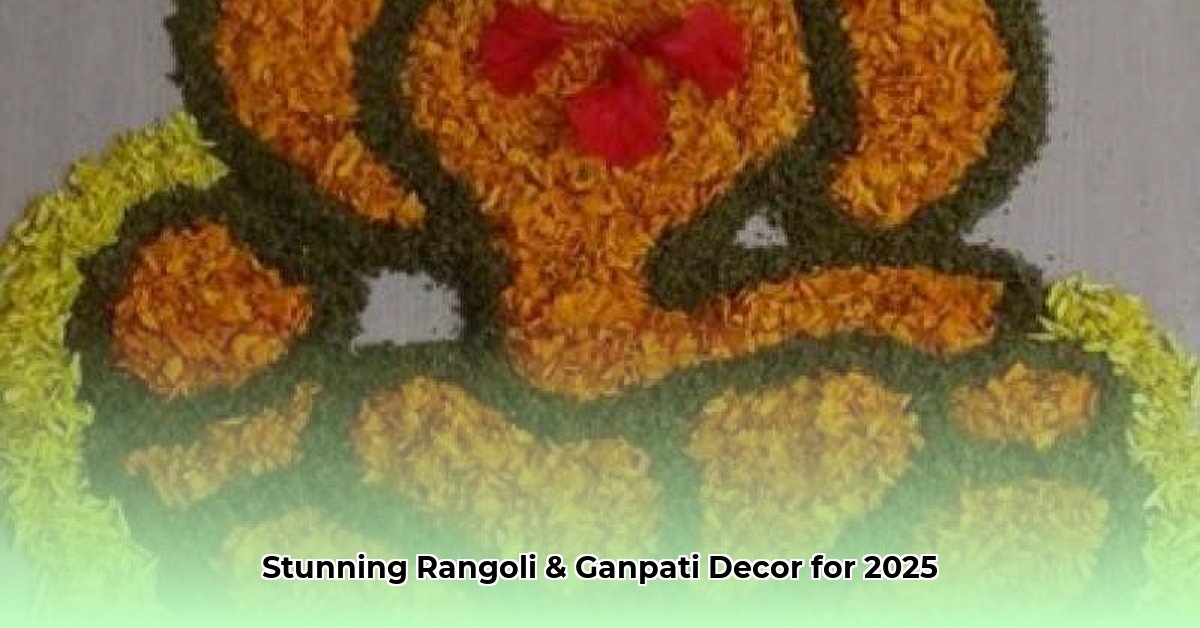Enhancing Your Ganpati Celebration with Rangoli
Ganesh Chaturthi is a time of joy and devotion. In 2025, elevate your celebration by incorporating the vibrant art of rangoli. Whether you’re a beginner or a seasoned artist, rangoli offers a beautiful way to welcome Lord Ganesha into your home. From simple patterns to intricate designs, rangoli adds a touch of tradition, color, and artistry to your festivities. Let’s explore how to create stunning rangolis and seamlessly integrate them into your Ganpati decorations.
Rangoli Designs: From Simple to Spectacular
Easy Rangoli Designs for Beginners
Creating a rangoli doesn’t require expert skills. These simple designs are perfect for beginners:
1. The Dotted Diya Rangoli: This design uses dots as a guide, making it incredibly easy to create.
- Materials: Rangoli powder, a plate or flat surface, chalk.
- Steps: Draw a center dot, surround it with six equally spaced dots, connect the outer dots to form a hexagon, fill in sections with color. Consider contrasting colors for a modern look.
2. The Geometric Ganesh Rangoli: A contemporary take on traditional rangoli, this design uses squares and clean lines.
- Materials: Rangoli powder, a flat surface, masking tape (optional).
- Steps: Create a square, divide it into four smaller squares, fill each section with contrasting colors. Visualize Lord Ganesh and let each square represent an aspect of his form.
3. The Petal Paradise Rangoli: A vibrant and fragrant option, this rangoli uses fresh flower petals.
- Materials: Fresh flower petals, a flat surface.
- Steps: Create a central design (circle or spiral), layer petals outward, varying colors and sizes. Add leaves or twigs for a natural touch. Diyas around the rangoli can enhance its beauty.
Intricate Rangoli Designs for Experienced Artists
Take your rangoli artistry to the next level with these more complex designs:
1. The Layered Lotus Throne: Create a three-dimensional lotus flower using overlapping petals and color gradation.
- Steps: Sketch the lotus outline, fill outermost petals with a deep color, gradually transition to lighter shades inward. A diya in the center adds a touch of illumination.
2. Ganesha’s Image: Incorporate a detailed image of Lord Ganesha using a stencil.
- Steps: Select a stencil, position it securely, fill with color (textured powders, metallic paints, or mirrors), carefully remove the stencil. Framing the image with marigolds enhances the visual impact.
3. Embellishments and Color Palette: Elevate your rangoli with embellishments like mirror chips, beads, or dried petals. Experiment with unconventional colors beyond traditional reds and yellows. Deep indigo, turquoise, or emerald green can add layers of meaning.
Integrating Rangoli into Your Ganpati Mandap
Strategically placing your rangoli within your mandap enhances the overall festive atmosphere. Consider these locations:
- Entrance: Welcomes guests with a vibrant display of art and devotion.
- Base of the Ganpati Idol: Offers a beautiful artistic tribute.
- Prasad Table: Adds a touch of festivity to the food offering area.
Rangoli Materials: Exploring Your Options
| Material | Description | Pros | Cons |
|---|---|---|---|
| Powdered Pigments | Finely ground colors | Vibrant, readily available, easy to apply | Can be messy, susceptible to wind |
| Colored Sand | Dyed sand | Textured effects, suitable for outdoors | Can be less vibrant, heavier to work with |
| Flower Petals | Fresh or dried | Natural, fragrant, adds a 3D element | Can wilt, requires careful handling |
| Stencils | Pre-cut designs | Easy for beginners, creates intricate patterns | May limit creativity |
| Natural Dyes | Plant-based colors | Eco-friendly, traditional, symbolic meaning | Can be less vibrant, may require preparation |
| Ready-Made Rangoli | Stickers or pre-designed patterns | Convenient, quick solution for limited time or skills | Might lack the personalized touch of handcrafted rangoli |
| Metallic Powders | Powders with a metallic sheen | Adds sparkle and a modern touch | Can be more expensive than traditional powders |
| Grains (Rice, Pulses) | Dyed or natural grains | Eco-friendly, textured, unique visual appeal | Can be time-consuming to prepare and apply |
Tips for Rangoli Success
- Practice: Some experts suggest practicing with chalk before using rangoli powder.
- Surface Preparation: Ensure your surface is clean, dry, and level.
- Color Harmony: Consider the overall color scheme of your decorations.
- Lighting: Diyas or other lighting can enhance the beauty of your rangoli.
- Eco-Friendly Options: Opt for natural and biodegradable materials whenever possible. Ongoing research into biodegradable rangoli colors offers promising solutions for sustainable celebrations.
Creating a rangoli for Ganesh Chaturthi is more than just decoration; it’s an act of devotion, an artistic expression, and a beautiful way to welcome Lord Ganesha. Let your creativity flow and make your 2025 celebration truly special.
- How to Get Motor Oil Out of Clothes: Proven Methods & Step-by-Step Guide - April 25, 2025
- How to Get Mothball Smell Out of Clothes: A Complete Guide - April 25, 2025
- How to Get Highlighter Out of Clothes: Easy & Effective Stain Removal Guide - April 25, 2025










